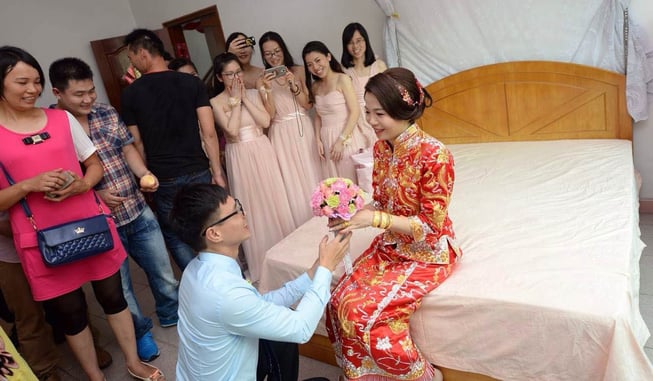Most traditional Chinese weddings are two days long. The previous day, my cousin had her bachelorette party, which was more like a huge work party. Most of her relatives came, ate food, and helped decorate the house for the big day. As a result of this, my sister and I were exhausted the morning of the wedding, but we had agreed to go to my cousin’s house early to help the rest of the ladies with their hair and makeup. The groom was due to arrive shortly after lunch to pick up his bride.
The bride wore a Chinese 裙褂 (qún guà), a two-piece gown in red. Red is considered to be an auspicious color in Chinese, so its common for Chinese brides to wear this at some point in their ceremony to bring in luck for their marriage. The gown was also embroidered with a dragon and a phoenix, with the dragon representing the male and the phoenix representing the female. Having the two side by side signifies the balance between the bride and groom, which will lead to a long, happy marriage.
TESTING THE GROOM
The groom picking up the bride from her house is where tradition comes into play. The bride is locked in her room wearing brand new shoes while the groom and his groomsmen need to fulfill a certain number of challenges in order to get access to the bride’s room. This is the most exciting part if you are a part of the bridal party. The tasks range from making the men transfer seaweed to each other mouth-to-mouth, to eating spoonfuls of wasabi. Completing these tasks is not enough though. The last step is to give the bridesmaids a “开门红包(kāi mén hóng bāo),” a red pocket with a certain amount of cash that is previously decided by all the bridesmaids.
This is the best part of being a bridesmaid, because they get to tease people, watch what is essentially live comedy, and get paid for it! The groomsmen were rowdy but good sports about the activities we made them do, no matter how ridiculous. It showed how much the groom loved his bride, to be willing to put up with the devious antics of the bridesmaids.

TEA CEREMONY
Before the groom was able to head back home with his bride, a traditional tea ceremony took place for the bride’s side of the family. The married couple poured tea and paid their respects to their elders, and in return, the elders gifted the married couple with gold jewelry (usually bangles) or more red envelopes of cash (红包 hóng bāo.) As maids of honor, my sister and I were in charge of helping the bride put on her new jewelry and collecting all of their 红包 into a designated bag. This whole process was long and quite tedious, especially in such hot weather.
After the tea ceremony, everyone drove over to the groom’s house with the car’s emergency flashers on. The reason for this was because the cars were in a wedding procession single-file line, going less than 40 miles per hour. At the time, I thought about how annoyed I would be if I were driving on that same freeway.
Once we arrived at the groom’s house, everyone indulged in some snacks, and the bride’s family left shortly after. Then, another tea ceremony commenced, but this time it was with the groom’s side of the family. Once again, I helped by collecting red envelopes and putting jewelry on the bride. There were so many red envelopes, I had to empty out the bag a couple of times! In my opinion, Chinese weddings are expensive for the relatives, but rather lucrative for the newlyweds!
THE WEDDING RECEPTION
The wedding reception only had guests from the groom’s side of the family, so my sister and I were the only people from home keeping my cousin company. I thought it was very unusual that the in-laws were separated, as it would have also been cheaper if the two families had decided to hold their receptions together.
The reception took place by a river with canopy overhangs covering the table. I was already exhausted at that point, but the hard work was only just beginning – and it had just started to rain. The bride had to make visits to all the tables to pour tea for elders. My sister and I had to follow her around carrying her train, holding an umbrella, holding our own dresses up in the hopes of keeping them dry, and collecting 红包. We had to make these rounds again at the end of the reception to do congratulatory cheers, which consisted of yelling “Cheers” or “干杯 (gān bēi!)”
If you asked me how the food tasted, I would not be able to tell you. I spent my time following the bride, so I couldn't eat much of it. On the way home, my sister and I bought some dim sum as a late night snack to tide us over until the next day.